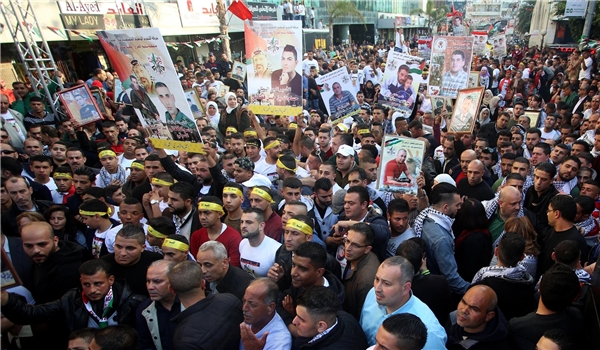
RNA - The small protest march set off from Yasser Arafat Square in Central Ramallah, but got into trouble when it reached the Beit El checkpoint to the north of the city, which was manned by soldiers from the Israeli Defense Forces (IDF), RT reported.
According to the Palestinian news agency Ma’an News, events took a violent turn when the IDF soldiers fired rubber-coated steel bullets on the protesters, injuring three. The protesters responded by setting bins on fire and hurling stones at the Israeli soldiers.
Tear gas was also used, but Ma’an News reported that the wind blew it back toward the IDF.
Over 1,000 Palestinian prisoners are currently taking part in what is reported to be one of the biggest hunger strikes across Israeli jails in recent years. It started in Hadarim prison where the West Bank’s ruling party Fatah leader, Marwan Barghouti, is serving a prison sentence for five counts of murder during the Second Intifada. The strike was announced on April 17, Palestinian Prisoners Day, an annual occasion dedicated to the thousands of Palestinian activists and militants being held in Israeli jails.
As well as Fatah prisoners, the strike also involved members of the militant groups Hamas and Islamic Jihad, and has the support of both the Palestinian National Council and Palestinian Prime Minister Rami Hamdallah. The prisoners are demanding the Israel Prison Service improve their prison conditions, including access to healthcare, telephone use and visitation rights.
“Hunger striking is the most peaceful form of resistance available,” Barghouti wrote in an Op-Ed in the New York Times. “Decades of experience have proved that Israel’s inhumane system of colonial and military occupation aims to break the spirit of prisoners and the nation to which they belong, by inflicting suffering on their bodies, separating them from their families and communities, using humiliating measures to compel subjugation. In spite of such treatment, we will not surrender to it.”
But Gilad Erdan, Israel’s public security minister, claimed the hunger strike was really a front for an internal power struggle between Palestinian factions.
“The strike led by Barghouti is motivated by internal Palestinian politics and therefore includes unreasonable demands concerning the conditions in the prisons,” said Erdan, as quoted by the Times of Israel. “I have instructed the Prison Service to act in any way to contain the strike within the walls of the prisons and the Israel Police to prepare and provide any help needed to the prison service for any scenario that is likely to develop.”
Fatah call for a Day of Rage to take place on Friday in solidarity with the hunger strike, as well as a general strike on Thursday.
847/940